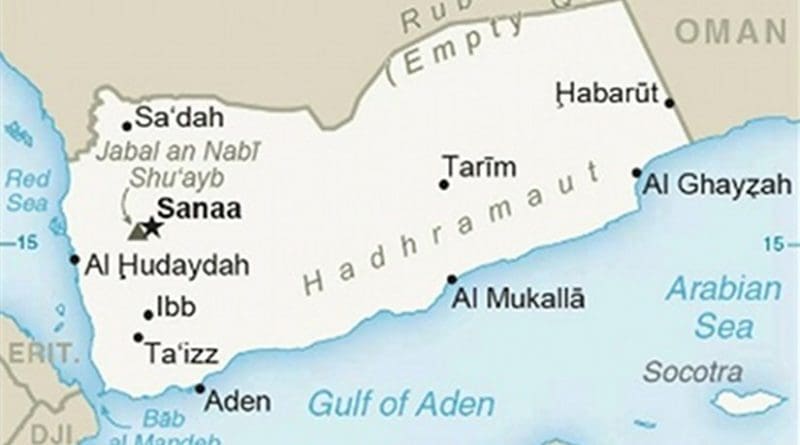The Final Nail In Yemen’s GPC’s Coffin? – OpEd
Gone are the days when Yemen was ruled by the General People’s Congress, one of the oldest political parties in Yemen. Since 2011, Yemen has been politically polarized and its geography is being contested by multiple players.
The GPC has not survived the consequences of the political quagmire and it has fragmented particularly since after the brutal end of former president Ali Saleh. The fragmentation of the party has emerged on the surface. Roughly a month after its founder’s demise, the GPC has appeared lacking in a coherent vision, and its leading members have not been on the same page.
The path to obsolescence
The GPC has three different prime factions nowadays. One is in Sanaa; the other is in Saudi Arabia and third is UAE-based. The Sanaa faction is forcibly supportive of the Houthis. The Riyadh faction is loyal to the legitimate government and the UAE faction is represented by the Saleh’s son, Ahmed Ali, who has been in Abu Dhabi for years. The fragmentation of the party has been evident, and the wounds this party has sustained will not be healed. Instead, the splits are paving the way for its obsolescence.
Last week, the Sanaa-based GPC faction declared a new party head, attempting to fill the vacuum sparked by Saleh’s death. However, the declaration of the new head brought more divisions more than unity amongst the party members. The affiliates of the GPC are not in Sanaa solely, and the recently appointed head of the party does not please, satisfy or win the support of all leading GPC members.
Previous to announcing the new head, hope existed that the GPC would manage to handle its unprecedented plight and unite efforts in the face in this adversity. This has not happened, and the party has fragmented almost one month following the passing of its cunning architect.
One faction says it will persist combating the “aggression” of the Saudi-led coalition, yet the other faction pledges to fight the Houthis and purge Yemen from the “Iran-allied militias.” The gulf between their stands is extremely wide, denoting the fundamental disintegration the GPC is undergoing.
Since the uprising breakout in 2011, Yemen has been embroiled in continuous turmoil.
As the ruling party at the time, the GPC could not rescue the country or realize the magnitude of the crisis. Today, the party is also unable to protect itself against the internal deadly divides.
Beneficiaries of the GPC fragmentation
Though Yemen’s GPC divides complicate the political scene, they have brought some advantages to some political players in the country. Practically, the Houthis have lost the political coverage provided by this party. However, they have tightened their iron grip further, and they do not fear political rivals in areas under their control. Instead, their efforts are fixated on the front lines.
Over the last three years of Houthi-GPC alliance, the two partners could not hide their differences on enormous issues. In November of 2016, the Houthis and the GPC formed what they the national salvation government. As the performance of the government was characterized with infectiveness, the two sides traded the accusation of poor performance. With the GPC is on more part of the Sanaa-based government, the Houthis have loosened up, doing what they want unopposed. This is how the Houthis are a beneficiary of the GPC’s lost leverage. But it should be remembered that the Houthi benefit of killing Saleh will not be a long-term one.
The other beneficiary of the GPC plight is the internationally recognized government. Since the Houthi takeover of Sanaa in September of 2014, the government is pointing the finger at former president Saleh. The late GPC’s head, Saleh, was believed to be the mastermind of the Houthi rapid expansion in diverse parts of Yemen.
The government knew the fact that the GPC has an embedded political presence in the country, and this party’s backing for the Houthis has delayed the victory of the Saudi-backed Yemeni forces. Today, the GPC is no longer an obstacle to the government military progress against the Houthis. Many GPC members have automatically shifted alliance to the legitimate government following the demise of their party leader.
The GPC’s recent divides have been taken as an advantage to intensify the government military advance against Houthi-controlled areas. In cooperation with military units loyal to the GPC, the coalition-backed government forces pushed the Houthis away from multiples areas over the past weeks. This is an example of how the government and the coalition have capitalized on the fury of the pro-GPC forces and supporters, scoring some progress against the Houthi militants on the ground.
Confused followers
Indeed, the GPC enjoys millions of supporters in Yemen. Today, they are torn between allegiance to the Houthis or the Saudi-led coalition. The Houthis killed their icon, and the coalition has left a devastating impact on the country since its military intervention in Yemen. What is the judicious option? And who does merit the support? Such questions are baffling, leaving the GPC followers confused.
Some GPC members continue to call the Arab Coalition as “aggressors,” while others deem them an indispensable force to defeat the Houthis and rid Yemen of the Iranian influence.
The GPC sounds as if it has lost its compass, its irreplaceable head. The leading members and mass supporters are not contented with the paths they are taking, but they have to. The GPC now cannot maneuver to have what it craves, cannot fight alone and cannot survive without support. Recovering from the fallout of this terrible experience is not an effortless task, and this experience could be the ultimate nail in its coffin.
*Khalid Al-Karimi is a reporter from Yemen

